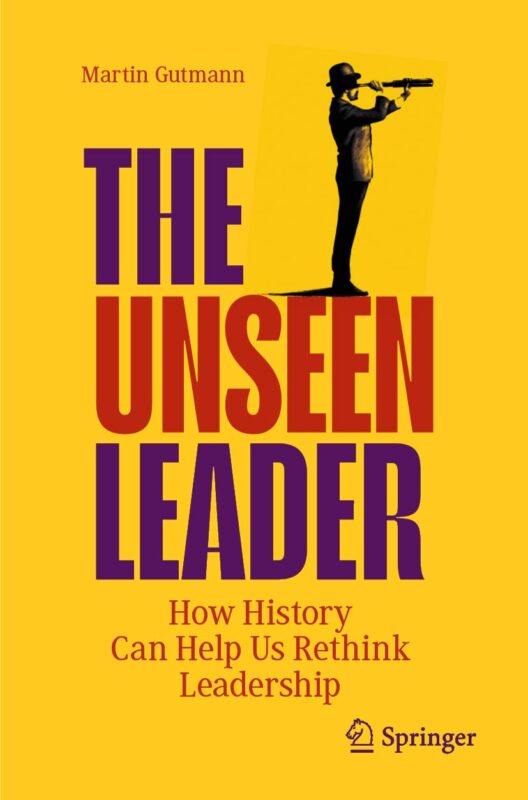
Martin Gutmann, an author and professor at the Lucerne School of Business, challenges traditional views on leadership with his concept of the “action fallacy.” He argues that effective leadership often involves subtle, unnoticed actions rather than just visible, dramatic ones. Gutmann emphasizes the importance of historical skills in the digital era, particularly in scrutinizing and distilling information. He also highlights the value of strategic inaction in leadership, as exemplified by Churchill’s delay of the Normandy invasions. Additionally, he notes that while emotional intelligence is important, not all impactful leaders visibly exhibit it. His perspective broadens the understanding of leadership, recognizing the significance of quieter, less conspicuous contributions.
Key Takeaways:
[03:57] Martin sheds light on his intriguing book, “The Unseen Leader: How History Can Help Us Rethink Leadership.” He talks about the concept of the “action fallacy,” challenging the common misconception that effective leaders are defined by dramatic actions. He shares insights into the disconnect between historical scholarship and contemporary leadership narratives. Using examples like Churchill, he highlights the importance of recognizing unseen leaders who strategically navigate challenges rather than creating chaos. Martin also explores the less-known explorer Roald Amundsen, emphasizing his overlooked achievements due to a lack of sensational crises.
[11:07] Martin discusses the intriguing dynamics of crisis management and leadership recognition. He draws parallels between special operations and the business world, exploring the tendency to reward leaders when situations go awry. He emphasizes the need to celebrate those who adeptly navigate and mitigate crises, challenging the prevailing culture that often glorifies crisis-oriented behavior. Martin also touches on the paradox of success going unnoticed and reflects on the story of Lawrence of Arabia, exploring misconceptions and contrasting narratives of characters.
[13:27] Martin shares the captivating story of Gertrude Bell, an often-overlooked leader in the post-World War I Middle East. Despite being the driving force behind the creation of Iraq and achieving remarkable feats in archaeology and translation, Bell’s contributions have been overshadowed by the more cinematic narrative of Lawrence of Arabia. He delves into Bell’s leadership style, emphasizing her pen-and-paper approach and strategic diplomacy in contrast to Lawrence’s adventurous exploits.
[17:22] Martin unveils the nuanced leadership of Winston Churchill during World War II, challenging common misconceptions. Jim and Jan also express amazement at discovering previously overlooked aspects of Churchill’s role, emphasizing the deliberate crafting of the narrative portraying Britain standing alone in 1940. Martin highlights Churchill’s strategic communication skills in influencing U.S. involvement and draws parallels to modern political strategies. He also touches on the power of storytelling in shaping history and explores how the Internet age has democratized historical perspectives.
[19:24] Martin discusses the challenges historians face in navigating the vast sea of information, from scarcity in ancient times to the overwhelming abundance today. He talks about how emerging digital tools and AI are reshaping historical scholarship, emphasizing the need for historians to adapt their skill sets. He then shifts to talk about the relevance of historical disciplines for contemporary business professionals, highlighting the importance of adopting investigative mindsets and discernment in distilling relevant information. Martin underscores the significance of applying lessons from historical narratives to enhance decision-making in the modern business landscape.
[25:31] Martin challenges the traditional notion that action is always the hallmark of effective leadership, arguing for the virtue of strategic inaction. Drawing on historical figures such as Churchill, Martin talks about exploring instances where restraint and reflection played pivotal roles. Jim and Jan ask about the importance of emotional intelligence, Martin then discussing how self-awareness of one’s traits can impact leadership effectiveness. Martin encourages everyone to reassess the leaders they celebrate, this episode advocates for recognizing and promoting individuals whose subtle yet profound impact is often overlooked.
[37:09] Closing quote: And remember, who controls the past controls the future. Who controls the present controls the past. — George Orwell
The Leadership Podcast is sponsored by W.S. Darley & Company.
Founded in 1908, Darley remains a family owned and operated business, providing the highest quality equipment solutions to our country’s warfighters and firefighters.
Learn more at darley.com and darleydefense.com
Quotable Quotes
“The first is that the leader who haphazardly ventures into the water, almost drowns, flails around, and then somehow miraculously makes it onto the other side, that's going to be the more interesting example to look at.” Share on X “The first thing to point out is that sometimes there is a crisis that you have done nothing to generate, and then you need to respond.” Share on X “There are certain persons who are very crisis prone, either because they seek out a crisis or they learn to reframe everything as a crisis.” Share on X “We're in a position of responsibility, and we're in a position where we can set an example, I think we need to start not only celebrating these crisis prone individuals, but also celebrating the people who avoid crisis, who… Share on X “We pay more attention to a crisis, and we like people who are willing to stand firm in a crisis.” Share on X “If you want to learn about unseen leaders, people who exerted influence but maybe not in a position of authority within a hierarchy, there are going to be even fewer sources available.” Share on X “There may be other people who are having a greater impact that might just be harder to spot in your organizations. “ Share on X “Emotional intelligence is a key competence for leaders to cultivate.” Share on X “There are certain scenarios in which reacting quickly and immediately is the right course.” Share on X “Inaction is really the right action, and we should celebrate it.” Share on X “You have to go back and examine some of the original sources to come away from it with a different perspective on the events and his role in those events.” Share on X
Here are the books mentioned in our discussion with Martin
Resources Mentioned
- The Leadership Podcast | theleadershippodcast.com
- Sponsored by | www.darley.com
- Rafti Advisors. LLC | www.raftiadvisors.com
- Self-Reliant Leadership. LLC | selfreliantleadership.com
- Martin Gutmann LinkedIn | www.linkedin.com/in/martin-gutmann
- Martin Gutmann Website | www.martingutmann.com/unseen





Recent Comments